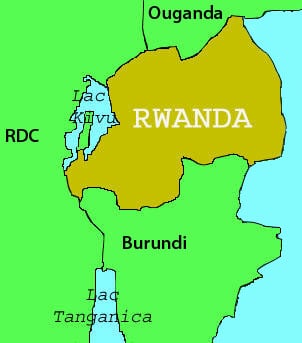“Rwanda’s Untold Story”: UK Calls on Rwanda to Restore BBC Broadcasting in Kinyarwanda

The U.K. Foreign Office called on the Rwandan government to lift the ban on its BBC broadcast in the language of Rwanda and Burundi in Rwanda. The government banned the native language broadcast after the BBC broadcast “Rwanda’s Untold Story,” a documentary [posted below] which upends conventional belief about the Rwandan massacres of 1994 and the government in Rwanda today.
Transcript
KPFA Weekend News Anchor David Landau: Earlier this week, the British Foreign Office called on the Rwandan government to lift its ban on the BBC broadcast inside Rwanda in the country’s native Kinyarwanda language. The Rwandan government suspended the broadcast and accused the BBC of “genocide denial” last October, after it had broadcast the documentary “Rwanda’s Untold Story” in the U.K.
“Rwanda’s Untold Story” challenges the conventional wisdom about the Rwandan massacres of 1994. U.S. academics Alan Stamm and Christian Davenport told the BBC producers the vast majority of those who died in the massacres were Hutus, not Tutsis.
Rene Mugenzi
Rwandan President Paul Kagame’s former officers and officials told the BBC that Kagame did not mobilize his army to save Rwandan Tutsis but to seize power in Rwanda. And Belgian scholar Filip Reyntjens told the BBC that President Kagame is the greatest war criminal in office today.
KPFA’s Ann Garrison spoke to Rene Mugenzi, a Rwandan exile and activist in London. She filed this report.
KPFA/Ann Garrison: BBC Gahuza, the BBC broadcast in the language of Rwanda and Burundi, is produced in London with Rwandan and Burundian journalists based in London, Rwanda and Burundi. Rwanda and Burundi share the Hutu, Tutsi and Twa ethnic demographics, speak the same language, and share much of the same history characterized by rivalry between majority Hutu and minority Tutsi.
BBC Gahuza continues to broadcast on its FM signal in Burundi and on the internet, where a few people with internet access in Rwanda can hear it. Before the Rwandan government banned the FM broadcast in Rwanda, it reached the entire country, including even rural villages. Rene Mugenzi, Rwandan exile and founder of the Global Campaign for Rwandan Human Rights, said that it had been Rwanda’s only real news broadcast.
Rene Mugenzi: That radio is the only Rwandan language-speaking radio that has programs that have all the voices from different backgrounds, different opinions, and that brings the real news, which is not controlled by the Rwandan government. That radio was the most popular radio in Rwanda because it was the only one that the population can trust 100 percent in terms of providing political and security news, because in Rwanda, local media is much controlled.
BBC Gahuza is the only radio service broadcasting in the Rwandans’ native language that “brings the real news,” Mugenzi says. This is a 2011 story on BBC Gahuza’s website.
It cannot dare criticizing the government or interviewing people who also criticize the government. That radio was providing the free media the way it should be.
KPFA: Mugenzi said that he and fellow exiles in London and around the world welcomed the BBC documentary “Rwanda’s Untold Story,” which finally brought much of what they had been saying for 20 years to a major media audience with global influence.
Rene Mugenzi: After that program, most of the Rwandan community in the U.K. and the other countries have been very, very happy towards that program, because the program has been able to portray what most of us have been saying for the past 20 years – the reality of what really happened in Rwanda, what really happened in 1994 and what is happening now.
And because most of the media have been portraying images which have been sponsored or influenced by the Rwandan government, this documentary was very major, very breakthrough in showing the truth about what happened.
KPFA: In a statement calling for restoration of the BBC Gahuza broadcast in Rwanda, the British Foreign Office also called on the Rwandan government to respect human rights and cited human rights abuses including the arrest and disappearance of dissidents, lack of due process for detainees, the murder of former Rwandan intelligence chief Patrick Karageya, multiple assassination attempts on the life of former Rwandan Gen. Kayumba Nyamwasa, and the ongoing imprisonment of political opposition leaders including Victoire Ingabire.
Mugenzi said that was welcome, but that the Foreign Office had cited Rwandan human rights abuses in Rwanda many times before, and that if the British government is serious, it will suspend aid and impose sanctions on top officials responsible.
If the British government is serious, it will suspend aid and impose sanctions on top officials responsible.
In 2011, Mugenzi went to Amnesty International with evidence that Rwandan President Paul Kagame’s Rwandan Patriotic Army was guilty of massacring 8,000 Rwandan Hutu people in an Internally Displaced Persons, or IDP camp in southwestern Rwanda in 1995. Shortly after that, the BBC and the London Independent reported that British police had warned Mugenzi and another Rwandan exile, Jonathan Musonera, that they were in danger of being assassinated by agents of the Rwandan government in the U.K.
For Pacifica, KPFA Radio, I’m Ann Garrison.
Oakland writer Ann Garrison writes for the San Francisco Bay View, Black Agenda Report, Black Star News,Counterpunch, Colored Opinions and her own website, Ann Garrison, and produces for AfrobeatRadio on WBAI-NYC, KPFA Evening News, KPFA Flashpoints and for her own YouTube Channel, AnnieGetYourGang. She can be reached at [email protected]. In March 2014 she was awarded the Victoire Ingabire Umuhoza Democracy and Peace Prize for promoting peace in the Great Lakes Region of Africa through her reporting.



